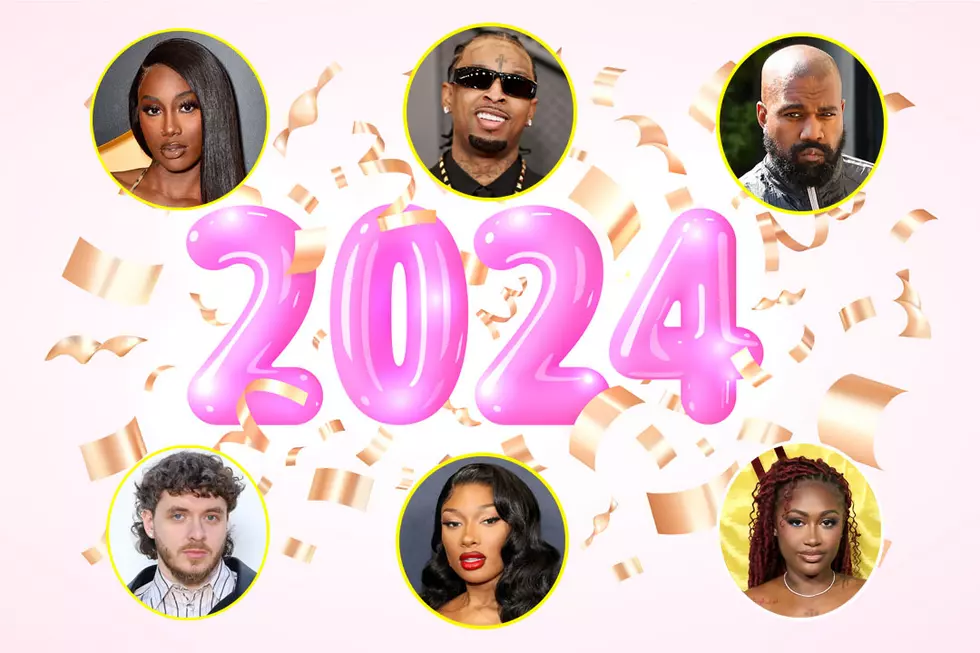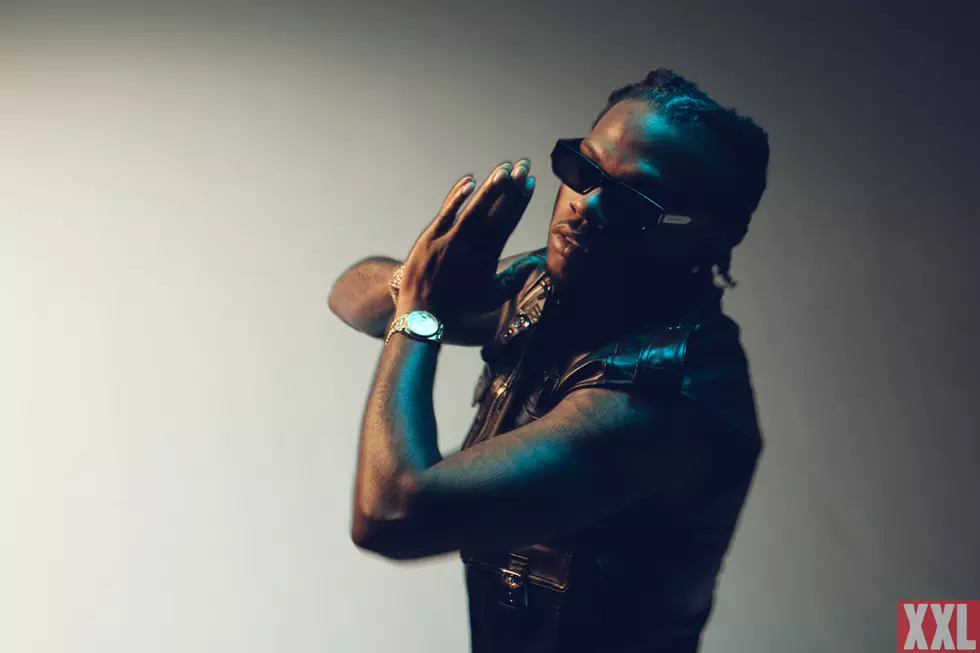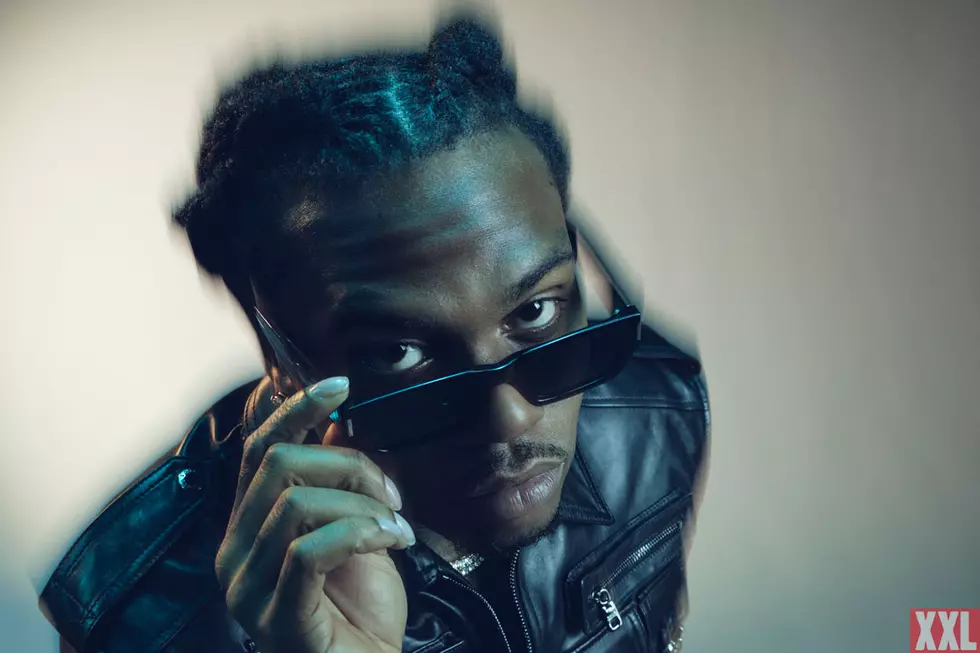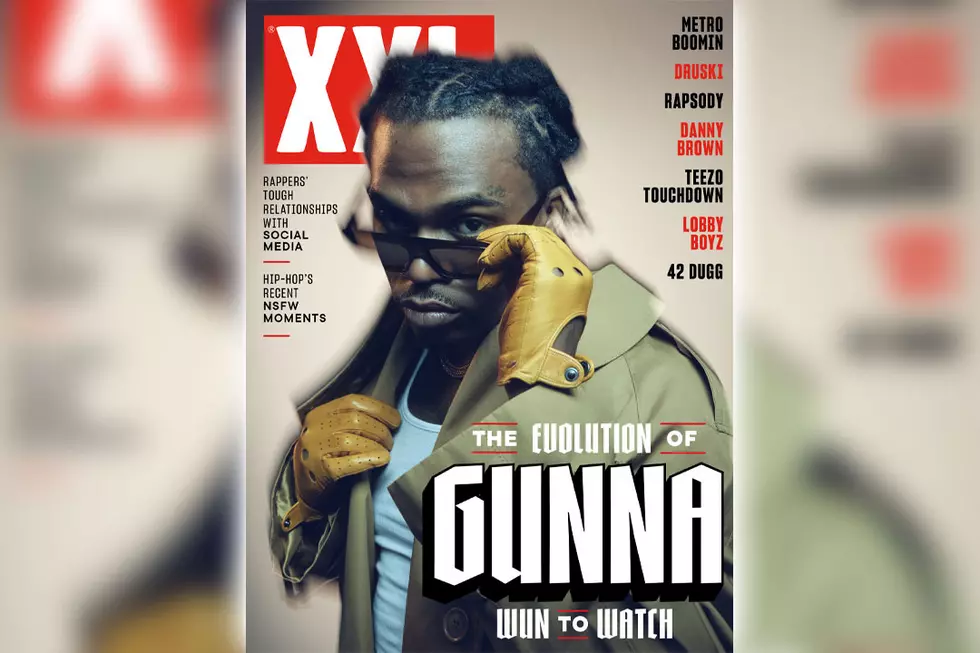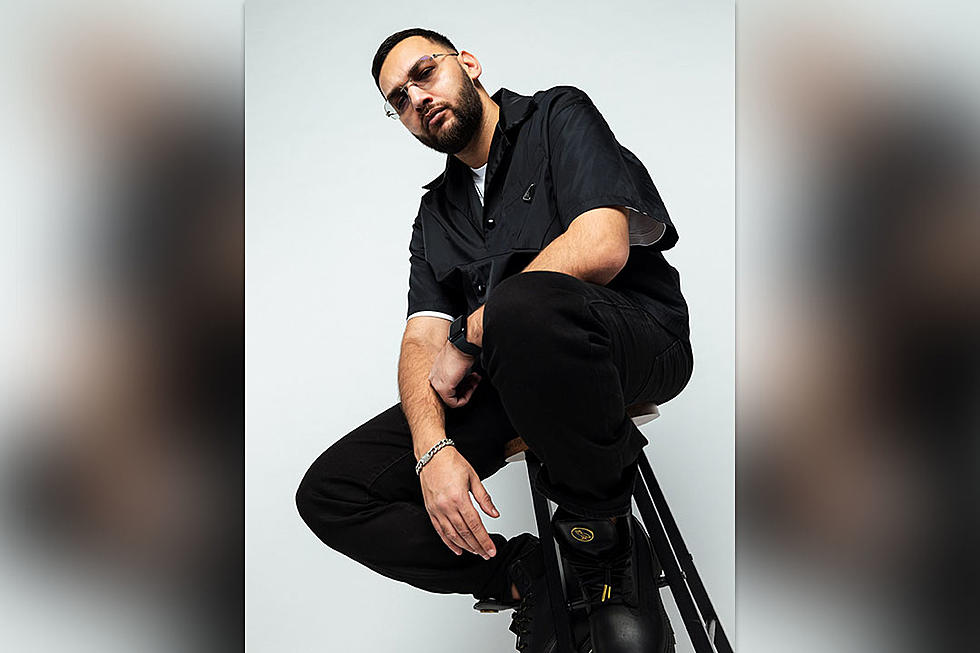Ice Cube
If You Ain’t Gangsta

Upstairs, in the studios that house New York radio station Hot 97, a small knot of people await this afternoon’s special guest. Downstairs, in the lobby of the building—also home to N.Y.C.’s carpenter union—the man they’re waiting for is wearing exactly what you’d expect: black. Black jacket, black sneakers, black-on-black Dodgers cap.
He looks exactly like he did six years ago, when he dropped his last solo joint. In fact, he looks exactly like he did 15 years ago, when he said, “I can cut that Jheri juice and get a bald head.” The only real difference, the only thing that says 2006, is his black T-shirt. It reads, in big silver letters, “CRUNK!!!” Below that, in smaller print, are the words “energy drink.”
But because the 36-year-old Ice Cube looks exactly like he always has, people walking by invariably notice him.
“Cuuuuuube.” This from a squad of four.
“Ayo, Cube!” This from a young cat with his peoples. He doesn’t look old enough to vote yet, let alone drink legally, but he’s smiling as his head swivels, his attention’s on the man in black.
Ice Cube looks up, nods and smiles back. “Ay, man.”
Young Cat With His Peoples says, “I like that show, baby! That show is tight!” Black.White., the whose-race-is-it-anyway reality TV series that Cube executive produced, premiered last night, and New York’s been buzzing about it all day.
“Thanks, man. ’Preciate it.” Despite the smile, this last bit sounds like straight Doughboy, straight outta Singleton, straight outta Compton.
“Cube!” This from two fortysomething White dudes with old-school outer-borough accents: Ireland by way of Queens, N.Y. “Cube! You gonna join Carpenters Local 608 or what?”
“Fa sho’, man. I’ma…” He pauses. Just for the barest split second. Enough time to read his audience and know what they want to hear. “I’ma teach y’all how to DROP THE FUCKIN’ HAMMER!”
The White guys cackle. They love it. “Keepin’ it real!” one of them exclaims.
“I’m the father of this gangsta shit/Never thought that I’d have a bunch of bastard kids” —Ice Cube, “Child Support”
There aren’t many pedigrees in hip-hop to rival that of the man born O’Shea Jackson. He was 14 when he met Dr. Dre, 16 when he wrote the song “Boyz-N-the Hood.” He was a founding member of N.W.A, responsible for Eazy-E’s lyrics, then bounced after a bitter dispute over money. (Famously, he received only $30,000 for the 1989 double-platinum Straight Outta Compton.) He headed to New York and linked up with the Bomb Squad for 1990’s mind-blowing AmeriKKKa’s Most Wanted, and followed it up with the equally skull-crushing West Coast classics Kill at Will and Death Certificate. It’s difficult to overstate the importance of his contribution to rap. He took the political consciousness of KRS-One and Chuck D and injected the clear-eyed menace of L.A. gang culture, merging the heady with the hard core more successfully than any MC before or since. His trademark scowl is one of the most enduring images in hip-hop’s short history.
“Cube’s always been my favorite rapper,” says Atlanta party-starter Lil Jon, who’s featured him on a couple of songs recently, and produced three tracks on Cube’s new album, Laugh Now, Cry Later. “I used to listen to that N.W.A album every fuckin’ day. Leavin’ high school, me and my boy in his Toyota Tercel with the house speakers in the back bumpin’ N.W.A.”
Looking back, the years around 1990 belonged to no one else. Inarguably, Cube’s artistic achievement, and his subsequent foray into the movie game, paved the way for the cultural dominance hip-hop enjoys today. It’s been a long time, though. As painful as it is, the question stands: Is Ice Cube still relevant? Thanks in large part to the success he’s found in Hollywood, it’s been six years since his last solo record, War & Peace: Vol. 2 (The Peace Disc). (Westside Connection, Cube’s supergroup with WC and Mack 10, issued Terrorist Threats in ’03). And honestly, it’s been closer to a decade since the streets were really talking about Cube the rapper.
Legend status isn’t an insurance policy in hip-hop: Chuck, Rakim and too many others have struggled to connect with listeners who consider 1996 “old school.” In Cube’s case, some of what he represented—hard beats, harder lyrics—is still in vogue, but some of what he represented—Nation of Islam knowledge of self, politically righteous rage—is not. And he’s not one to bend to trends like talking about a bank account or jewels. “That shit is cool,” he says. “But I grew up in an era when the music I was listenin’ to was relevant to what I was goin’ through, regardless who was doin’ it. I didn’t care how much money rappers had.”
 But whether hip-hop has stagnated isn’t the issue. Rather, it’s whether Cube can reach a generation who knows him more from the multiplex than the 106th & Park countdown. “It’s a harder game,” Cube allows. “But I come in it just worried about Ice Cube fans. That’s it. If I get my fan base, the record is a success to me. I’ve always been around a million, million two, million three. So that’s my goal, to get my fans, and then from there we’ll see what the record do.” The response shows a bracing realism. Over his career, Cube’s gone platinum six times out of seven albums, but he’s only broken 2 million once, with 1992’s The Predator—and that one took nine years to do it.
But whether hip-hop has stagnated isn’t the issue. Rather, it’s whether Cube can reach a generation who knows him more from the multiplex than the 106th & Park countdown. “It’s a harder game,” Cube allows. “But I come in it just worried about Ice Cube fans. That’s it. If I get my fan base, the record is a success to me. I’ve always been around a million, million two, million three. So that’s my goal, to get my fans, and then from there we’ll see what the record do.” The response shows a bracing realism. Over his career, Cube’s gone platinum six times out of seven albums, but he’s only broken 2 million once, with 1992’s The Predator—and that one took nine years to do it.
Laugh Now, Cry Later takes aim at those 1.3 million fans. For the most part, it’s a close-knit Cali affair. Snoop, WC and Kokane show up; Mike Epps throws in a lil’ interlude; and there’s only a few boldfaced names behind the boards—notably, Scott Storch, Lil Jon and Swizz Beatz. The album eschews the ruled-by-committee, let’s-appeal-to-every-region ethos so prevalent today. It’s some West Coast shit, basically. Some spare, bouncing, hard-knock shit, perfect for Cube’s deliberate baritone. Even the imported megaproducers bring tracks that are tailor-made to an L.A. sound. “Cube is a triple-triple OG,” Swizz says. “I just tried to put myself in the consumer’s place. What the fuck would I wanna hear from Cube? So ‘Stop Snitchin’,’ which I did, you can definitely Cripwalk to that one.”
Then there’s the Storch-helmed single “Why We Thugs.” It’s got those hand-clap snares reminiscent of the Sir Jinx era, like “Steady Mobbin’” recast for the ’06, and it has Cube doing what Cube does best: politicized hard core. “Call me an animal up in the system/But who’s the animal who built this prison?/…I got caught by 5-0/Grandmother came to court with her Bible/But when the judge hit the gavel/Now I’m too far for my family to travel/I just came unraveled/Socked the D.A. before I got gaffled/Owned by CA, state property/Just like the year 1553.”
“We ain’t tryin’ to reinvent the wheel,” says Cube. “The album is very West Coast. Just bein’ true to myself, and let the chips fall where they may.”
Continue reading this feature in the July 2006 issue of XXL (#82).
More From XXL

